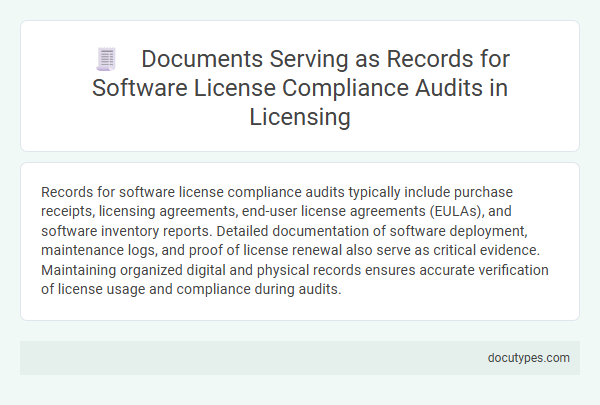Records for software license compliance audits typically include purchase receipts, licensing agreements, end-user license agreements (EULAs), and software inventory reports. Detailed documentation of software deployment, maintenance logs, and proof of license renewal also serve as critical evidence. Maintaining organized digital and physical records ensures accurate verification of license usage and compliance during audits.
Introduction to Software License Compliance Audits
What documents are essential records for software license compliance audits? Software license compliance audits require thorough documentation to verify lawful software use and adherence to licensing agreements. Key records include software purchase invoices, license agreements, and usage logs to ensure transparency and accuracy during the audit process.
Importance of Documentation in License Auditing
Proper documentation is critical for ensuring software license compliance during audits. Maintaining accurate records can protect your organization from legal risks and financial penalties.
- License Agreements - These documents define the terms, conditions, and permissions for software use, serving as the foundational reference for compliance.
- Purchase Invoices - Invoices provide proof of software acquisition, verifying the legitimacy and quantity of licenses owned.
- Deployment Records - Logs and reports showing how and where software is installed help auditors verify adherence to license restrictions.
Purchase Invoices and Proof of Software Acquisition
Purchase invoices serve as critical records for software license compliance audits, providing verifiable proof of legitimate software acquisition. These documents detail the transaction date, vendor information, and software licensing terms, ensuring clarity during audit evaluations.
Proof of software acquisition complements purchase invoices by validating the ownership and authorized use of software products. Maintaining organized records of licenses, receipts, and acquisition emails strengthens audit readiness and reduces risk of non-compliance penalties.
License Certificates and Entitlement Records
License certificates serve as official proof of software purchase and authorization, outlining the specific terms and conditions under which the software can be used. These documents are crucial during compliance audits to verify the legitimacy and scope of software usage.
Entitlement records detail the rights granted to the license holder, including the number of installations, user limits, and upgrade permissions. Maintaining accurate and accessible entitlement data ensures seamless verification and helps avoid penalties during software license compliance audits.
End-User License Agreements (EULA)
End-User License Agreements (EULA) serve as primary records during software license compliance audits. These documents outline the terms, restrictions, and permitted usage of software, ensuring that installations align with licensing agreements. You must maintain accurate EULAs to demonstrate compliance and avoid potential legal issues.
Software Deployment and Installation Logs
Software deployment and installation logs serve as critical records for software license compliance audits. These logs provide detailed information about when, where, and how software applications were installed or deployed across an organization's network. Maintaining accurate deployment and installation records helps demonstrate adherence to licensing agreements and supports audit readiness.
Inventory Reports from IT Asset Management Tools
Software license compliance audits require specific documents to verify proper usage and adherence to licensing terms. Inventory reports generated by IT Asset Management (ITAM) tools are critical records in this process.
These inventory reports provide detailed lists of installed software, license keys, and usage metrics across your organization's devices. They help auditors confirm that software deployments match purchased licenses and identify potential overuse or under-licensing. Accurate, up-to-date ITAM reports reduce audit risks and support compliance strategy effectively.
License Key and Activation Records
Software license compliance audits require precise documentation to verify legitimate usage. Proper records help avoid penalties and ensure your software usage aligns with license agreements.
- License Keys - Unique alphanumeric codes that authenticate and validate your software installation.
- Activation Records - Logs or receipts documenting when and where software was activated to prevent unauthorized use.
- Purchase Invoices - Proof of license acquisition supporting the legitimacy of installed software.
Maintaining organized license keys and activation records is critical for passing compliance audits efficiently.
Renewal and Maintenance Contract Documentation
Renewal and maintenance contract documentation is crucial for software license compliance audits. These records validate ongoing support and update entitlements from your software vendors.
- Renewal Agreements - These documents confirm the extension of your software licenses beyond the initial term.
- Maintenance Contracts - Records that specify the terms for software updates, patches, and technical support services.
- Payment Receipts - Proof of payment for renewal fees and maintenance services, demonstrating financial compliance with license terms.
What Documents Are Records for Software License Compliance Audits? Infographic

